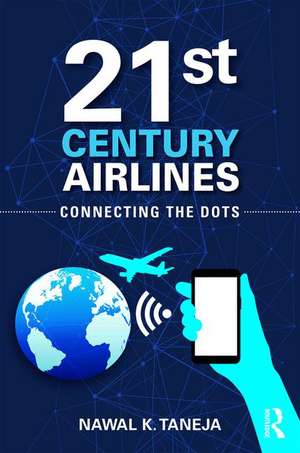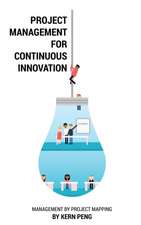21st Century Airlines: Connecting the Dots
Autor Nawal K. Tanejaen Limba Engleză Hardback – 4 sep 2017
The book synthesizes insights gained from the experience of non-traditional businesses, such as Uber, that have no physical assets and that focus on scalability through platforms, as well as traditional businesses, such as Mercedes-Benz, that are transitioning from operators of physical assets to adapt to the on-demand and sharing economies. These insights show pragmatically that digitizing airline businesses would require digital mind-sets, digital technologies, digital strategies, and digital workplaces to explore new frontiers in value for both customers and airlines. Moreover, forward-thinking airlines need to consider working with bimodal organizational structures, in which one group optimizes current business models (network, fleet, and schedule planning, as well as revenue management) while a second group explores innovative ways to add digital features to physical products to provide a consistent experience throughout the journey.
The book is written for all senior-level practitioners of airlines and related businesses worldwide, as well as senior-level government policymakers.
| Toate formatele și edițiile | Preț | Express |
|---|---|---|
| Paperback (1) | 320.95 lei 6-8 săpt. | |
| Taylor & Francis – 30 sep 2021 | 320.95 lei 6-8 săpt. | |
| Hardback (1) | 473.97 lei 6-8 săpt. | |
| Taylor & Francis – 4 sep 2017 | 473.97 lei 6-8 săpt. |
Preț: 473.97 lei
Nou
90.70€ • 94.16$ • 75.63£
Carte tipărită la comandă
Livrare economică 24 martie-07 aprilie
Specificații
ISBN-10: 1138093130
Pagini: 282
Ilustrații: 29 Line drawings, black and white; 1 Tables, black and white; 29 Illustrations, black and white
Dimensiuni: 156 x 234 x 20 mm
Greutate: 0.56 kg
Ediția:1
Editura: Taylor & Francis
Colecția Routledge
Locul publicării:Oxford, United Kingdom
Public țintă
Professional and Professional ReferenceCuprins
List of Tables
Acknowledgements
Forewords
Introduction
- Responding to Changing Customer Expectations
Super-Connected Travelers
Corporate Travelers
Globalization of Consumers
Implications for, and Responses of, Airlines
Full-Service Airlines
Developments within the Low-Cost Sector
Takeaways - Platform-Based and Networked Businesses: New Forms of Collaboration
The Macroeconomic Shift: Industrial Era to Digital Era
Platforms
Network Effects
Technologies
Data
Internet of Things
Cloud Computing
Artificial Intelligence (AI) and Augmented Reality (AR)
Human Resources
Implications for Airlines
Takeaways - Innovating and Evolving Airline Network Planning
Current and Evolving Systems
Conventional Planning Module Limitations
New Modules and Integrative Planning
Examples of Comprehensive, Dynamic, and Integrated Planning
What is Next?
Takeaways - Re-thinking Revenue Management
Historical Perspective
Existing System and Process Challenges
Step-Changing Options: Opportunities and Challenges
Customer Segmentation and Personalization
Pricing and Fare Management
Customer Experience
Takeaways - Re-designing Services for Next-Generation Customer Experience
Multi-industry insights
Mercedes-Benz
Uber
USAA
Westpac
Re-defining value and designing for it
Mapping the experience
Managing loyalty and brand
Critical Success factors
Building a platform
Managing service and experience during disruptions
Takeaways - Re-thinking the Airline Business for the Digital Era
Platforms
Digital Mindset
Digital Technologies
Digital Strategies
Digital Workplace
New Forms of Transportation
Takeaways - Thought Leadership Pieces
- Loyalty at the Forefront of the Transformation Curve by Evert de Boer, General Manager Global Business Development, Travel, Aimia
- High-Level Check List for developing a Data Strategy by Gary Doernhoefer, Vice President & General Counsel, Journera
- Radical Digitization of Businesses by Stefan Jenzowsky, SVP, Siemens Convergence Creators
- The Flexible Flyer: Turning the Airlines Operating Model Downside UP by Dietmar Kirchner, Senior Aviation Advisor, Frankfurt/Germany
- Meeting the Expectations of Todays’s Connected Customers and Empowered Passengers: On-Demand, Real-Time, End-to-End by Raymond Kollau, Founder AirlineTrends
- Competition and Digitization by Dianchun Li, Chief Commercial Officer, Hong Kong Airlines
- How much a threat from Long Haul Low Cost by Keith McMullan and James Halstead, Managing Partners, Aviation Strategy Ltd
- Connecting the Dots at the Airports: The Potential of Transformation with Artificial Intelligence by Jim Peters, Chief Technology Officer, SITA
- The Future of Secondary Airports by Parm Sidhu, Airport General Manager, Abbotsford International Airport
- The changes & challenges affecting sales and distribution in the airline world by Trevor Spinks, Head of Sales and Distribution, Tiger-Scoot
- Shifting Mind-Sets from Asset Management to Customer Value while Building a New Speed into the Business by Chris Stevens, Managing Partner, Digital Partners and Robin Barlass, Director of Strategy and Support Services, Metro Trains
- The Evolving Paradigm of Interactive Selling based on Consumer Preferences by Ben Vinod, Senior Vice President and Chief Scientist, Sabre
- Leadership Challenges in a Disruptive Era by Monika Wiederhold, Managing Director, Amadeus Germany
Descriere
In 21st Century Airlines: Connecting the Dots, Nawal Taneja addresses the challenges and opportunities facing the airline industry as it tries to innovate and create products and services that are radically different by `connecting the dots' at four key levels: recognizing the implications of global events, improving cross-functional collaboration within the organization, working more closely with the travel chain, and providing much higher engagements with connectors within the social networks. The book synthesizes insights gained from the experience of non-traditional businesses, such as Uber, that have no physical assets and that focus on scalability through platforms, as well as traditional businesses, such as Mercedes-Benz, that are transitioning from operators of physical assets to adapt to the on-demand and sharing economies. These insights show pragmatically that digitizing airline businesses would require digital mind-sets, digital technologies, digital strategies, and digital workplaces to explore new frontiers in value for both customers and airlines.
Moreover, forward-thinking airlines need to consider working with bimodal organizational structures, in which one group optimizes current business models (network, fleet, and schedule planning, as well as revenue management) while a second group explores innovative ways to add digital features to physical products to provide a consistent experience throughout the journey. The book is written for all senior-level practitioners of airlines and related businesses worldwide, as well as senior-level government policymakers.



















